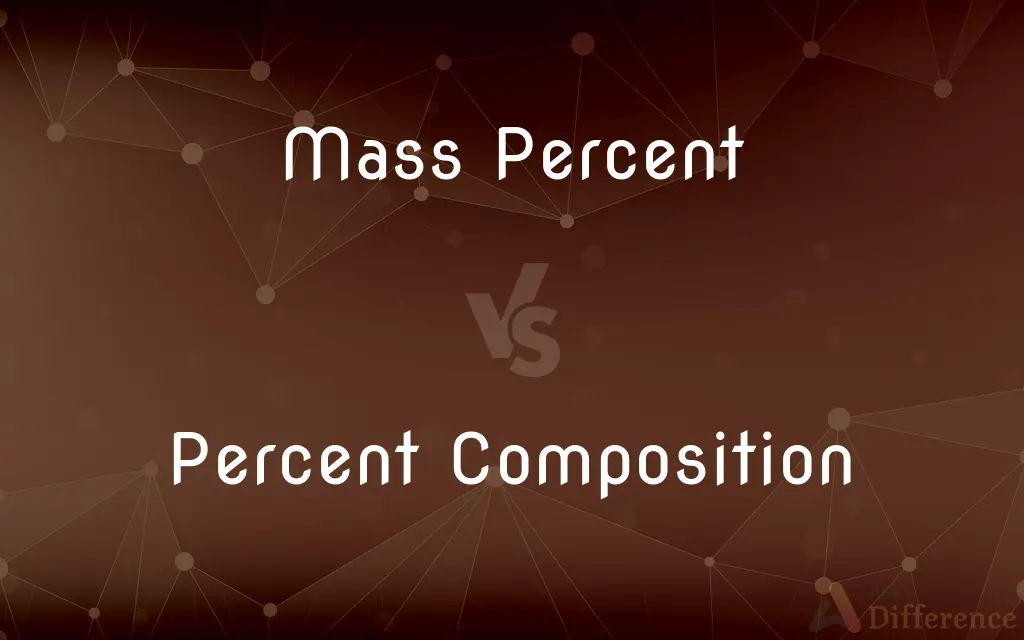Mass Percent vs. Percent Composition — What's the Difference?
By Tayyaba Rehman — Published on November 22, 2023
Mass Percent denotes the concentration of a component in a mixture as weight percent, while Percent Composition refers to the percentage by weight of each element in a compound.

Difference Between Mass Percent and Percent Composition
Table of Contents
ADVERTISEMENT
Key Differences
Mass Percent and Percent Composition are both used in chemistry to represent concentrations. While Mass Percent is often utilized to describe the concentration of a component in a mixture based on weight, Percent Composition primarily pertains to the proportion of each element in a chemical compound.
To calculate Mass Percent, one uses the formula: (mass of component/total mass of mixture) x 100%. In contrast, to find Percent Composition, the formula is: (mass of the element/molar mass of the compound) x 100%.
Mass Percent is versatile and can be applied to various mixtures, including solutions, alloys, or any other heterogeneous or homogeneous mixture. On the other hand, Percent Composition is specifically tailored for compounds, detailing the composition of each constituent element.
Both Mass Percent and Percent Composition provide a way to express concentrations in percentage form, making them easily interpretable. However, while Mass Percent could refer to any component of a mixture, Percent Composition exclusively deals with elemental components in a compound.
In essence, both terms convey information about concentrations. However, Mass Percent is broader in application, whereas Percent Composition is more specialized, focusing on the elemental breakdown of compounds.
ADVERTISEMENT
Comparison Chart
Definition
Concentration of a component in a mixture based on weight.
Proportion of each element in a compound based on weight.
Formula
(mass of component/total mass of mixture) x 100%
(mass of the element/molar mass of the compound) x 100%
Application
Solutions, alloys, homogeneous or heterogeneous mixtures.
Specifically for compounds.
Component Type
Any component in a mixture.
Elemental components in a compound.
Use Case
Used in everyday chemistry, environmental science, etc.
Vital in stoichiometry and understanding chemical compounds.
Compare with Definitions
Mass Percent
Used in various fields like chemistry, biology, and environmental science.
In environmental studies, the Mass Percent of pollutants in air samples can be significant.
Percent Composition
Essential for quantitative analyses in chemistry.
To analyze a new compound, chemists first determine its Percent Composition.
Mass Percent
Expressed as the weight of a particular component divided by the total weight.
Determine the Mass Percent by dividing the weight of the solute by the total weight of the solution.
Percent Composition
Represents the percentage by weight of each element in a compound.
The Percent Composition of water is 11.2% hydrogen and 88.8% oxygen.
Mass Percent
A measure of concentration representing the mass of a component in a mixture.
The Mass Percent of salt in seawater is approximately 3.5%.
Percent Composition
Derived by dividing the mass of an individual element by the molar mass of the compound.
To find the Percent Composition of carbon in methane, divide the atomic mass of carbon by the molar mass of methane.
Mass Percent
Can be applied to both homogeneous and heterogeneous mixtures.
When preparing a metal alloy, the Mass Percent of each metal is carefully measured.
Percent Composition
Specifically tailored for compounds and not mixtures.
Percent Composition gives insights into how elements bond in a compound.
Mass Percent
A way to express the composition of mixtures in percentage form.
The Mass Percent gives a clear idea of how much solute is present per 100g of solution.
Percent Composition
Vital in stoichiometry and understanding molecular formulas.
Knowing the Percent Composition aids in determining empirical formulas.
Common Curiosities
Is Percent Composition limited to organic compounds?
No, Percent Composition can be determined for any chemical compound, whether organic or inorganic.
How is the Mass Percent of a solute in a solution calculated?
Mass Percent = (mass of solute/total mass of solution) x 100%.
Can Mass Percent be applied to solutions?
Yes, Mass Percent can be used to describe the concentration of solutes in solutions.
Why is Percent Composition essential in stoichiometry?
Percent Composition helps determine the empirical formula, which is foundational in stoichiometry.
Can two different mixtures have the same Mass Percent for a component?
Yes, different mixtures can have the same Mass Percent for a component but differ in other aspects.
How is Percent Composition different from mole fraction?
While Percent Composition is based on weight percentages of elements, mole fraction represents the ratio of moles of an element to the total moles in a compound.
Why is Mass Percent crucial in preparing mixtures?
Mass Percent ensures the correct proportion of each component, ensuring the mixture's desired properties.
What does a high Percent Composition of an element in a compound indicate?
A high Percent Composition indicates that the element contributes significantly to the compound's total mass.
Is Mass Percent always less than 100%?
Yes, since Mass Percent represents a component's fraction in a mixture, it is always ≤100%.
What does Mass Percent convey in a mixture?
Mass Percent conveys the concentration of a specific component in a mixture based on weight.
How is Percent Composition used in chemistry?
Percent Composition is used to represent the percentage by weight of each element in a compound.
Can both Mass Percent and Percent Composition be used interchangeably?
No, Mass Percent relates to mixtures, while Percent Composition pertains exclusively to compounds.
In which fields is Mass Percent commonly used?
Mass Percent is used in chemistry, environmental science, biology, and other related fields.
What happens if the Percent Composition of all elements in a compound is added together?
The sum of the Percent Composition of all elements in a compound will always equal 100%.
Does Percent Composition give insights into chemical bonds?
While Percent Composition indicates elemental proportions, it doesn't provide details about the type of chemical bonds.
Share Your Discovery

Previous Comparison
Omelette vs. Scrambled Egg
Next Comparison
Class 2 Hitch vs. Class 3 HitchAuthor Spotlight
Written by
Tayyaba RehmanTayyaba Rehman is a distinguished writer, currently serving as a primary contributor to askdifference.com. As a researcher in semantics and etymology, Tayyaba's passion for the complexity of languages and their distinctions has found a perfect home on the platform. Tayyaba delves into the intricacies of language, distinguishing between commonly confused words and phrases, thereby providing clarity for readers worldwide.












































